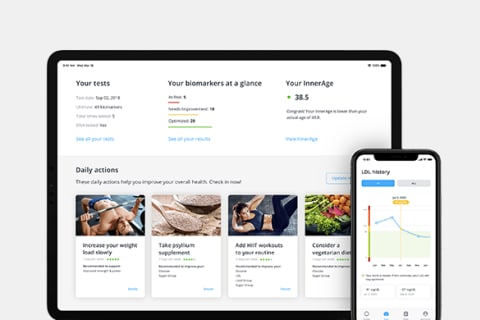Advertisement
4 Unexpected Things I Learned About My Health From A Science-Backed Nutrition Plan

As a brand strategist at mindbodygreen, optimizing my wellness is a daily priority. And as a certified personal trainer, fitness and nutrition are arguably the two most significant pillars in this routine. I read ingredient labels like I'm looking for typos, count macros, and time every meal to maximize my energy and performance.
But most of what I know about nutrition is based on either anecdotal personal experiences (that time I tried and failed at keto) or simple internet research—neither of which are precisely optimal in determining the perfect diet for my body and lifestyle. So when I learned there was an opportunity to dig deeper with InsideTracker and their revolutionary approach to personalized nutrition, I begged my editor to let me try it out.
Their Ultimate Plan analyzed 43 of my blood biomarkers to provide personalized recommendations for my nutrition and lifestyle. Here's what I learned from this experience, how I plan on implementing their Action Plan, and why taking control of your wellness from a science-backed approach is perfect for your 2021 routine.
Personalized nutrition is comprehensive, but the process is simple.
The idea of a nutrition plan that's "based off of your biomarkers" may seem complicated or overly sophisticated, but InsideTracker's system is surprisingly user-friendly. Once I ordered my plan, they sent me a lab slip to get blood work done—I visited my local Quest Diagnostics, but you can also opt for a mobile on-site blood draw (where a phlebotomist visits you), or just DIY and upload recent test results that match InsideTracker's biomarker for import.
A few days later, my results were waiting for me in my inbox. Forty-three biomarkers—from nutrients like magnesium and vitamin D to cholesterol to hormones—painted a holistic picture of my overall health in a way that I've never had access to before. My results were neatly laid out to show where I was in relation to my personal "optimized zone"—a more precise range than merely "normal" zones, determined by my age, gender, ethnicity, and activity level.
For years I was under the impression that as long as I was eating enough complete protein sources, healthy fats, and plenty of leafy greens, I was fueling my body "adequately." It turns out, "adequate" isn't exactly synonymous with "optimal"—and I'll probably never view my nutrition this way again. By combining my blood analysis with additional genetic data from InsideTracker's DNA Kit provided more precise recommendations because it harnessed the power of both my genetic potential and real-time blood data.
I haven't been prioritizing my liver health as I should.
Your liver is arguably the most underappreciated organ in your body, often even referred to as the "gatekeeper to good health." And because many of us place a considerable emphasis on foods that optimize our brain and heart health (not that we shouldn't), we might be doing so at the expense of optimal liver function.
I am definitely someone who fits into this camp, a fact that became clear from my InsideTracker results. It turns out my liver enzyme group—fueled by my high levels of ALT, AST, and GGT—might be at risk. According to InsideTracker R.D. Ashley Reaver, "These enzymes naturally exist in the liver and seep into the bloodstream when there is damage."
Luckily, my InsideTracker results had plenty of suggestions, including reducing my sugar consumption (good thing the holidays are over), taking a daily probiotic, and adding things like wheat germ to my diet. Still, there's one more factor I had never even considered—taper down my resistance training. You read that right—it turns out it is possible to overtax your muscles (are you listening, gym rats?), and doing so can significantly increase your liver function labs1. So while I've long relied on a routine that sometimes has me hitting the weights seven days a week, this was the wake-up call I needed to rethink how I optimize my training for overall health.

Yes, you can have too much of a vitamin in your system.
For me, that's B12, which is just north of my personal "optimized zone." You know vitamin B12 helps your body make red blood cells, nerves, and DNA, but its prevalence in animal protein sources makes it one of the most common deficiencies for people who follow a vegan diet. Fortunately for my B12, I eat meat; unfortunately, I also drink a fair amount of pre-workout supplements, which Ashley considers the likely culprit of my high levels.
On the other side of the optimized zone, you'll find my vitamin D. Shocker, I know—a year spent primarily indoors has caused my vitamin D levels to plummet (and there's a good chance yours have as well). Ashley says this could be causing some fatigue in my workouts, especially those marathon resistance-training sessions. According to her, "Vitamin D is not only important for immune health but also plays a role in performance. It can increase muscle power and stimulate muscle growth since it is associated with optimal testosterone production." And while you can get vitamin D from foods like fish and dairy, she says getting my levels back to normal requires something a little more substantial than a diet tweak—supplementing with 5,000 IUs per day for a few weeks should do the trick.
My "healthspan" needs more attention.
Among the fascinating results of my InsideTracker experience was learning my biological age, my "InnerAge." While the calendar says I'm 29, my biomarkers indicate that I'm aging faster than I should be—by more than five years, to be exact. This doesn't concern me in the short term, but definitely something to consider if I want to extend my "healthspan" as I (actually) get older. Healthspan is essentially the amount of time we spend free of life-threatening diseases, and it's often overshadowed by its more conventional cousin—life span—in the longevity conversation.
So perhaps 2021 is the year I finally optimize my healthspan as well. According to my InsideTracker recommendations, there are plenty of ways I can go about adding more life to my years and years to my life —and you can too! My Action Plan included five concrete nutrition and lifestyle recommendations to follow; while personalized to my results, they may serve as a friendly reminder of practices we could all be following:
- Eat plant-based one day/week.
- Consume 2 tablespoons of olive oil/day.
- Practice mindfulness 30 minutes/day.
- Play brain games every day (like Sudoku or crossword puzzles).
- Sleep seven to eight hours every night.
I've long considered myself one of the more well-informed eaters out there, but this experience might have been the wake-up call I needed to reassess and reprioritize. Here's to the moment I finally start eating, moving, and living the way my body needs me to.
Won't you join me?

